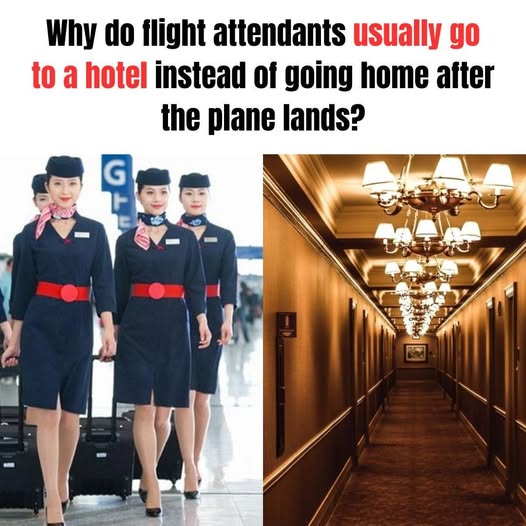It’s a common misconception that flight attendants return home after every flight. In reality, their schedules often require them to stay in hotels rather than head straight back to their own homes. This practice is not just about convenience but is deeply rooted in the unique demands of their job, aviation safety regulations, and the need to maintain their physical and mental well-being. Let’s explore the key reasons why flight attendants typically stay in hotels after landing.

Long and Exhausting Flight Schedules
One of the most significant factors is the physically and mentally demanding nature of their schedules. International flights or long-haul journeys can last several hours, sometimes stretching into double-digit flight times. Add to this the preparation, boarding, and deboarding processes, and a flight attendant’s day can easily extend beyond 12 hours.
This level of fatigue can take a toll on their ability to function effectively, making rest essential. Staying at a hotel allows flight attendants to recover, ensuring they are well-prepared for their next flight. Rest is not just about physical recovery—it also helps maintain focus and alertness, both of which are critical for safety and customer service during flights.
Compliance with Regulated Rest Requirements
Aviation authorities and airlines have strict regulations regarding rest periods between flights to protect the health of flight attendants and ensure passenger safety. These rules dictate the minimum amount of rest time required between shifts, particularly after long or taxing flights.
Staying in a hotel close to the airport makes it easier for flight attendants to adhere to these requirements. It eliminates the need for a potentially long commute home, which could eat into their mandatory rest time. By resting in a nearby hotel, they can maximize their recovery period and be ready to perform their duties effectively when their next shift begins.
Working in Different Cities or Countries
Unlike many professionals who have a fixed workplace, flight attendants often find themselves in different cities—or even different countries—after a flight. In such cases, returning home isn’t an option, as their schedules typically require them to stay at their destination for a short layover before embarking on the next leg of their journey.
Airlines arrange accommodations for flight attendants at designated hotels near the airport. These hotels are specifically chosen to provide a quiet, comfortable environment conducive to rest. Staying at these locations allows flight attendants to recharge without the stress of finding accommodations on their own.
The Nature of Their Work
The work of a flight attendant is inherently unique, involving irregular hours, varying shifts, and constant travel. Unlike a typical 9-to-5 job, flight attendants must be ready to work at any time of day or night, depending on their flight schedule.
Staying at a hotel offers flexibility and convenience that aligns with the demands of their profession. It provides them with a reliable place to rest, regardless of when or where their flight lands. This arrangement ensures they can meet the physical and mental challenges of their job while maintaining the high standards required in the aviation industry.
Convenience and Practicality
Hotels near airports are strategically located to minimize travel time for flight attendants. This proximity allows them to rest immediately after a flight, reducing stress and maximizing their recovery time. Additionally, these hotels often offer amenities like blackout curtains, soundproof rooms, and gym facilities, which cater to the specific needs of aviation professionals.
For airlines, providing accommodations in hotels also ensures that flight attendants remain close to the airport, making it easier to coordinate their schedules and manage any last-minute changes or emergencies.
Ensuring Health and Safety
Ultimately, the practice of staying in hotels is about safeguarding the health and well-being of flight attendants. Regular rest is essential for maintaining their energy levels, focus, and ability to respond to emergencies. In the high-pressure environment of air travel, these factors are crucial not only for the crew’s performance but also for passenger safety.
Conclusion
Flight attendants staying in hotels instead of going home after a flight is a necessity dictated by the nature of their job. Long flight schedules, regulated rest requirements, travel to different destinations, and the unpredictability of their shifts make hotels an ideal option for ensuring their health and compliance with aviation safety standards.
This practice highlights the unique demands of their profession and underscores the importance of rest and recovery in maintaining safety and service quality. So, the next time you see a flight attendant heading to a hotel after landing, remember that it’s not just about convenience—it’s an essential part of keeping both the crew and passengers safe and well-served in the skies.





